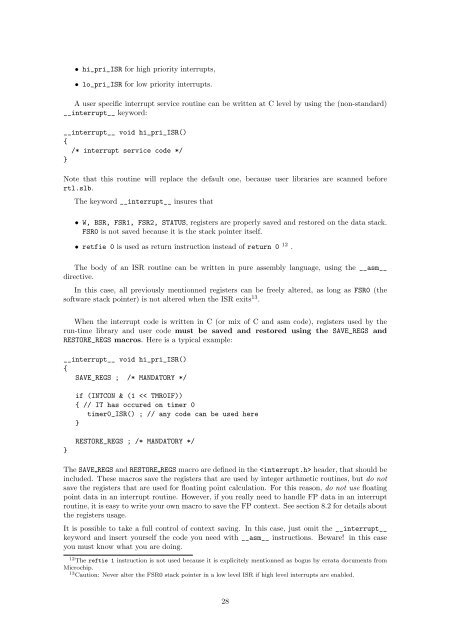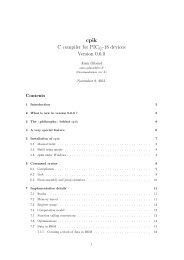cpik C compiler for PIC c -18 devices Version 0.7.1 - PiKdev, An IDE ...
cpik C compiler for PIC c -18 devices Version 0.7.1 - PiKdev, An IDE ...
cpik C compiler for PIC c -18 devices Version 0.7.1 - PiKdev, An IDE ...
Create successful ePaper yourself
Turn your PDF publications into a flip-book with our unique Google optimized e-Paper software.
• hi_pri_ISR <strong>for</strong> high priority interrupts,<br />
• lo_pri_ISR <strong>for</strong> low priority interrupts.<br />
A user specific interrupt service routine can be written at C level by using the (non-standard)<br />
__interrupt__ keyword:<br />
__interrupt__ void hi_pri_ISR()<br />
{<br />
/* interrupt service code */<br />
}<br />
Note that this routine will replace the default one, because user libraries are scanned be<strong>for</strong>e<br />
rtl.slb.<br />
The keyword __interrupt__ insures that<br />
• W, BSR, FSR1, FSR2, STATUS, registers are properly saved and restored on the data stack.<br />
FSR0 is not saved because it is the stack pointer itself.<br />
• retfie 0 is used as return instruction instead of return 0 12 .<br />
The body of an ISR routine can be written in pure assembly language, using the __asm__<br />
directive.<br />
In this case, all previously mentionned registers can be freely altered, as long as FSR0 (the<br />
software stack pointer) is not altered when the ISR exits 13 .<br />
When the interrupt code is written in C (or mix of C and asm code), registers used by the<br />
run-time library and user code must be saved and restored using the SAVE_REGS and<br />
RESTORE_REGS macros. Here is a typical example:<br />
__interrupt__ void hi_pri_ISR()<br />
{<br />
SAVE_REGS ; /* MANDATORY */<br />
if (INTCON & (1



